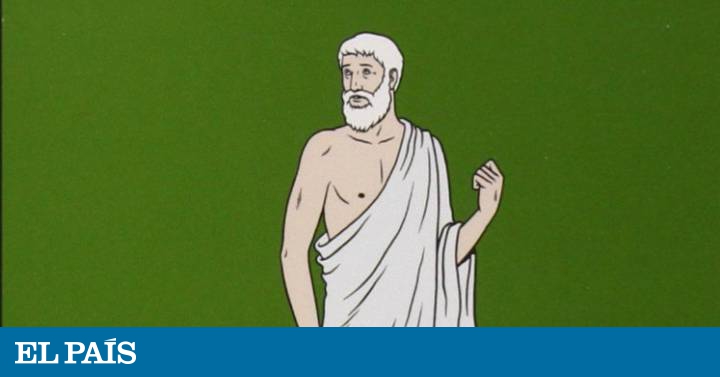Book VII of The Republic , opens with the story of one of the most famous myths: that of the cave. As soon as Socrates has begun to describe the men chained in front of the shadows, his interlocutor interrupts him: "What a strange scene you describe and what strange prisoners!" Socrates answers: "Just like us." That is the idea that guides philosophers: when they speak they do so about men, about themselves and about everyone else. The place and date of the writing does not matter: the discourse crosses borders and centuries to reach all possible presents.
Although not explicit, that is the idea behind the book by York University professor Catherine Wilson, How to be an Epicurean. A philosophy for modern life. The author explores the thought of Epicurus using the few texts of hers that have survived to date and the De rerum natura , by his Roman disciple, Lucretius. For Wilson, both speak of the present and their thinking serves to guide contemporaries who aspire to achieve a happy life or, at least, to reduce suffering.
The edition of Wilson's book coincides with the reissue of Philosophy for Happiness , which includes various fragments of Epicurus and three analyzes of the whole of his work, signed by Emilio Lledó, Pierre Hadot and Carlos García Gual, who is also the translator of the texts of the philosopher included in the volume. All scholars claim the timeliness of his work, although by different means. Wilson's book does not just keep its distance: the author assumes that epicureanism "is the most interesting system of antiquity" and is devoted to showing how it can become a guide for those who today seek happiness. His councils serve both as an individual guide and as a cover for collective ills, among which he cites growing economic inequality, widespread political corruption, threats from climate change and nuclear and chemical weapons, and depletion of natural resources .
They agree, of course, in highlighting various issues. The first, attempts to bury epicureanism throughout history. Lledó describes the philosopher as "one of the first victims of ideological censorship"; Hadot points out that "he was condemned (...) to a regrettable concealment", while García Gual prefers to compile some of the insults that were dedicated to him in antiquity: illiterate, rogue, prostitute, servile and sophist.
The second point of coincidence is the epicurean reasoning that leads to dispense with the gods. These are, for the philosopher, happy beings who live in their particular heaven totally oblivious to the quotas of men. It is useless to implore them, because it is impossible for them to listen to prayers or sacrifices. Neither the gods speak to men nor listen to them either.
The third coincidence is the vindication of pleasure, understood at the same time as enjoying the body and trying to reduce pain as much as possible. Pleasures include sexual pleasures that "are kind as long as they do no harm." Affirmation that explains, in part, the anger of Christian thinkers.
Man, a pure agglomeration of atoms, feels haunted by fear and needs, including hunger, thirst and cold, as one of the preserved fragments shows: "This is the cry of the flesh: not to be hungry , not to be thirsty, not to be cold .; Whoever has and hopes to have this could also rival Zeus in happiness. ” (Minor note: García Gual's translation is reproduced. Lledó and Hadot also cite the fragment, but the three versions have slight variations).
The epicurean statement about the uselessness of resorting to the gods to obtain favors links to one of the narrative axes of Science and philosophy in antiquity , by the Irishman Benjamin Farrington, which is now reissued with a prologue by José Ignacio de Latorre. The great advance that occurs in the origin of ancient science, Latorre maintains, quoting Farrington, was produced by "eliminating the miraculous of nature and history and replacing it with laws", giving rise to, rounds Latorre to "an intellectual leap of giant. Without it there is no modern science ”. Science arises by dispensing with the gods. Farrington's book, whose main virtues highlights clarity, covers the period from Egypt and Mesopotamia until the years of Alexander the Great, when Epicurean philosophy was born. The volume was published for the first time in Spanish in the early 1970s, in a memorable collection, Fortnightly Ariel, inspired by Manuel Sacristán, almost at the same time as another text by Farrington, La Revolución de Epicuro, alluded to by García Gual in the collective volume cited. The edition of Science and Philosophy ... also coincided with a PhD course on Epicurus taught by Emilio Lledó, still a professor in Barcelona.
Wilson traces the influence of Epicurus on the history of thought and perceives it in Thomas Hobbes, Jeremy Bentham, John Stuart Mill, Thomas Jefferson, Jean-Jacques Rousseau, Carlos Marx and Federico Engels. Her enthusiasm even leads her to propose social and labor reforms that tend to people's happiness, although she is aware that "the directors of the current boards are not very likely to point in that direction." However, the current situation is perfectly modifiable because political authority is neither natural nor derived from divine will. The government is an organization made by convention and, therefore, modifiable.
The atomism of Epicurus, heir to that of Democritus, turns men, pure matter, into ephemeral existences, which leads Wilson to affirm the desirability that justice be a thing of this world, because there is no other where it can be imparted: neither as a reward nor as punishment. All the cited authors also emphasize that epicureanism was one of the few schools of antiquity that accepted women on practically equal conditions with men.
In the antipodes of the epicurean tendency is the text of Augustine of Hippo, reissued by Guillermo Escolar in the collection The secrets of Diotima, under the title of The search for truth . These are chapters IV to VI of The Confessions. Augustine walks the path that leads him to God and separates him from the pleasures of the flesh. "Epicurus would have obtained a corner in my soul," he writes, "had it not been for the belief that after death the soul and all of our good deeds are still alive, an idea in which Epicurus refused to believe." It coincides with epicureanism in the will to reduce fear of death, but in very different ways. In the Augustinian case, the death of the body frees the soul for its encounter with God. For Epicurus, on the other hand, death is a minor problem if the idea of the natural limit of human beings is accepted: “Death is nothing to us. Because what has been dissolved is callous and callous is nothing to us. "
Faced with epicureanism, Augustine rejects the pleasures of this world and even questions the value of knowledge, which for Epicurus allowed fear to prevail: “Every time I hear this or that brother in faith speak of astronomy without having much idea (... ) I contemplate with resignation a man who is simply passing judgment, but I do not see that he is harmed by ignorance of the position and constitution of physical creation, provided that he is not believed what is not worthy of you "(he directs directly to God).
In a different tone and without taking other texts as a starting point for thought, Byung-Chul Han's The Disappearance of Rituals is situated . It is a set of reflections stitched together by a central idea: the production ends everything that life can be interesting and happy. The rituals confer "duration", in the face of a constant eventuality of life in a productive society dominated "by fear of death". Even language succumbs to productivity, loses its narrative character and becomes a "means of information", while forgetting how poetic it could return the joy of "breaking the economy of the production of meaning". All this due to a prevailing neoliberalism that “exploits even morals” and turns the subject into data; thinking, in algorithm.
There is an aspect of epicurean thought that also brings you closer to the present. This is alluded to by García Gual when he points out that he lived at a time when Athens had collapsed as a free city, after being defeated by Alexander the Great, and as a political project of coexistence, coinciding with the death of its defenders: Aristotle and Demosthenes. The loss of the political power of the polis in favor of the empires brings a distance between the citizen and the places where political decisions are made. Hence, the schools that appear in the so-called Hellenistic period and that continue in Rome, aim to seek happiness, either individually or in small communities, regardless of politics. Rulers are almost as far away and seem as callous to men as the gods of Epicurus.
News list
How to be an epicurean. A philosophy for modern life. Catherine Wilson. Translation by Joan Andreano Weyland. Ariel, 2020. 256 pages. 19.90 euros.
Science and philosophy in antiquity. Benjamin Farrington. Translation by P. Marset and E. Ramos. Prologue by José Ignacio Latorre. Ariel, 2020. 206 pages. 17 euros.
Epicurus. Philosophy for happiness. Texts by Emilio Lledó, Carlos García Gual and Pierre Hadot. Translation of Epicurus texts: Carlos García Gual. Hadot text translation: Javier Palacio Tauste. Errata naturae, 2019. 142 pages. 17 euros.
The search of the truth. San Agustin. Translation by José Manuel Ruiz Vela. Guillermo Escolar, 2020. 110 pages. 6 euros
The disappearance of rituals. Byung-Chul Han. Translation by Alberto Ciria. Herder, 2020. 120 pages. 12.05 euros












